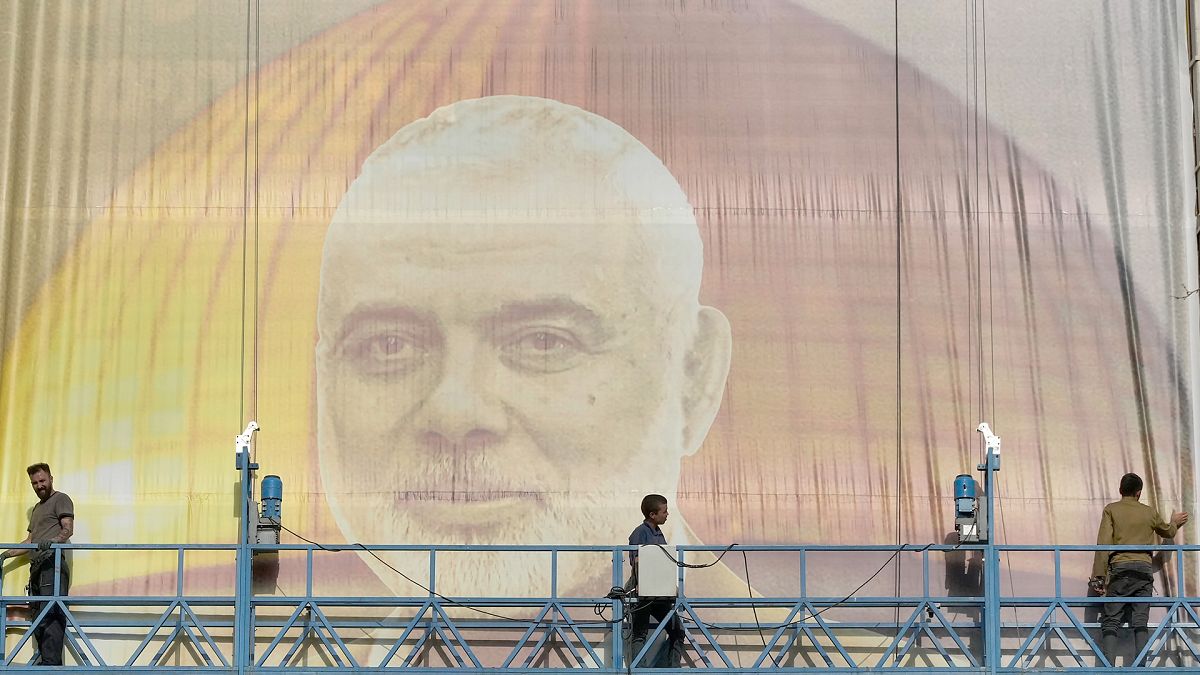Iran shuns European leaders’ appeal to not retaliate against Israel

Retaliation for Ismail Haniyeh’s assassination in Tehran would be “a solution for stopping crimes and aggression,” the Iranian president told the UK prime minister.
Tehran rejected the three European countries’ call asking it to refrain from any retaliatory strikes against Israel that would further escalate regional tensions.
Iran’s president told the UK prime minister that the regime in Tehran considers retaliation against Israel over the July killing of Hamas official Ismail Haniyeh a right and a way to discourage future aggression.
President Masoud Pezeshkian, in a late Monday phone conversation with UK Prime Minister Keir Starmer, said that a punishing response to an aggressor is “a right of nations and a solution for stopping crimes and aggression,” according to the state-run news agency IRNA.
The West’s silence about “unprecedented inhumane crime” in Gaza and Israeli attacks elsewhere in the Middle East was “irresponsible” and encouraged Israel to put regional and global security at risk, Pezeshkian added.
French President Emmanuel Macron, German Chancellor Olaf Scholz and UK Prime Minister Keir Starmer issued a joint statement Monday endorsing the latest push by mediators Qatar, Egypt and the US to broker an agreement to end the Israel-Hamas war.
The European leaders also called for the return of scores of hostages held by Hamas and the “unfettered” delivery of humanitarian aid and asked that Iran and its allies refrain from retaliation that would further escalate regional tensions after the late-July killing of Hamas political leader Ismail Haniyeh.
Israel has not confirmed nor denied its role in the assassination, but it earlier pledged to kill him and other Hamas leaders over the group’s 7 October attack on southern Israel that sparked the war in Gaza.
‘Lacking political logic’
In a further rejection of the three leaders’ request, the government in Tehran said Iran doesn’t need permission to retaliate for Haniyeh’s death.
“Such demands lack political logic, are entirely contrary to the principles and rules of international law, and represent an excessive request,” Iranian Foreign Ministry spokesperson Nasser Kanaani said.
Iran does not recognize Israel and supports anti-Israeli militant groups, including Hamas and Lebanon’s Hezbollah.
Mediators have spent months trying to get the sides to agree to a three-phase plan in which Hamas would release the remaining hostages captured in its 7 October attack in exchange for Palestinians imprisoned by Israel, and Israel would withdraw from Gaza.
Talks were expected to resume Thursday.
After more than 10 months of fighting, the Palestinian death toll is nearing 40,000 in Gaza, according to the Health Ministry there.
Related
A New Book Argues That What Happens in Europe Doesn’t…
Remaking the World: European Distinctiveness and the Transformation of Politics, Culture, and the Economy by Jerrold Seigel “No issue in world
Poland plans military training for every adult male amid growing…
Poland’s prime minister, Donald Tusk, has said his government is working on a plan to prepare large-scale military training for every adult male in response t
2025 European Athletics Indoor Championships: Ditaji Kambundji secures women’s 60m…
Switzerland’s Ditaji Kambundji walked away from the 2025 European Athletics Indoor Championships in Apeldoorn on 7 March with much more than her first Europea
Takeaways from the EU’s landmark security summit after Trump said…
BRUSSELS (AP) — European Union leaders are trumpeting their endorsement of a plan to free up hundreds of billions of








